Ethiopian News, Current Affairs and Opinion Forum
-
Selam/
- Senior Member
- Posts: 11861
- Joined: 04 Aug 2018, 13:15
Post
by Selam/ » 12 Apr 2024, 07:00
Bloomberg: A Crumbling Metro Reveals Failed Promise of China’s Billions in Africa

The Addis Ababa skyline is seen from the light rail system on Nov. 19, 2023.Photographer: Michele Spatari/AFP via Getty Images
By Fasika Tadesse
April 12, 2024 at 12:00 AM EDT
Almost a decade ago, the light-rail system in Ethiopia’s bustling capital of Addis Ababa was hailed as a revolutionary solution to the city’s transportation woes. Envisioned as a project that would redefine urban transport, the system promised to sweep up to 60,000 passengers per hour along its tracks.
Today it sits as a daily reminder of the broken promises of China-funded infrastructure investments that swept Africa in recent years. Frequent breakdowns, inadequate maintenance funding and operational constraints mean barely one-third of its 41 trains are operational, ferrying 55,000 passengers a day, a fraction of initial projections.
Once bustling and vibrant train stations now exude an air of desolation and neglect, contrasting sharply with the city’s urgent transportation needs for its almost 4 million residents. Inoperable trains are regularly parked at the railway’s garage, awaiting maintenance.
Overcrowding on those trains that do run has forced many commuters to seek new ways to get around. Yared Mekuanint, 36, who has been using the train since its launch, has largely abandoned the system.
Waiting times for a train can now stretch to 20 to 25 minutes, he said, four times the six minutes between services in the early days.
“You might not even get onto the train after all this wait, especially during peak hours,” he said. “You may realize it’s full, and no space to accommodate you, when the train arrives after all that wait. You have to wait another 20 minutes to try your luck with the next train.”
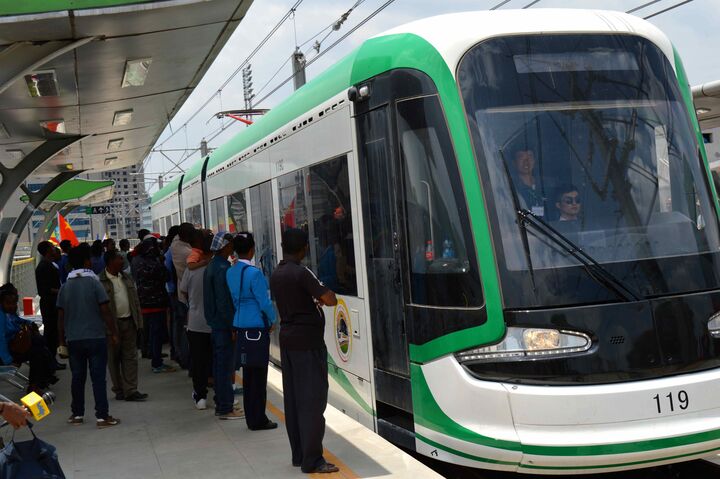
At its 2015 opening, the light rail network promised low-cost, efficient transport. Some users then said their commuting time was cut by two-thirds.Photographer: William Davison/Bloomberg
Despite the critical shortage of transportation options in the city, commuters are increasingly opting for public buses and privately operated mini-buses, albeit at a slightly higher cost compared to the light-rail system.
The light rail is among 70 mega projects that Ethiopia undertook with a $14.8 billion loan from the Chinese government and related financial institutions between 2006 and 2018, data from the Ministry of Finance show. The works include construction of the Ethio-Djibouti railway, an airport expansion, and major road-infrastructure projects.
From Kenya to Nigeria and beyond, China over the past decade has loaned billions across Africa and other parts of the so-called Global South as part of its drive to gain sway and counter US influence, build markets for its products and gain access to the natural resources needed to drive its economy back home. The US says the money simply leaves host governments mired in debt.
China Railway Engineering Group spearheaded the three-year construction effort, followed by an additional three years of managing operations and maintenance post-launch along with another Chinese firm, Shenzhen Metro Group. The project, with a total cost of $475 million, relied heavily on an 85% loan from the Export-Import Bank of China, with the remaining funds sourced from the government’s coffers.
During the ribbon-cutting ceremony in September 2015, former Transport Minister Workneh Gebeyehu, who is currently the executive secretary at the Intergovernmental Authority on Development regional economic bloc, said the railway would have a transformative effect.
“We’re confident that this railway will bring about significant improvements in the transportation network,” he stated.
As time passed, lofty promises made by officials and the high expectations of commuters have failed to materialize. And numerous obstacles mean no turnaround is imminent.
Key hurdles include frequent power outages, inadequate local maintenance facilities, limited availability of spare parts, and challenges in accessing foreign currency for importing spare parts from China, says Mitiku Asmare, head of the city’s transport agency.
The greatest concern is the project’s inability to repay its debt, resorting to local bank loans to stay afloat. And running the system below capacity means revenue is insufficient to cover future payments.
The project may have prioritized short-term political goals over long-term operational sustainability, says Frangton Chiyemura, a lecturer in Global Development at the UK Open University’s Development Policy and Practice Group who studies China-Africa relations and Chinese-funded projects in Africa.
The project’s original sin was poor planning, with insufficient arrangements in place to cover needs including maintenance work, spare parts, and the required local skills to sustainably run the project, Chiyemura said. He cited a standard-gauge, China-backed railway in Nigeria as an analogue to the Ethiopian metro, saddling the government with infrastructure and its associated maintenance costs.
Addis Ababa officials are now seeking solutions for a turnaround. Previously run under the management of the Ethiopian Railway Corporation — the national operator overseeing the Chinese built Addis Ababa–Djibouti Railway — the local system has now been transferred to the city transport agency.
“We are currently looking for a consultant to examine the challenges, identify their sources, and provide recommendations on how to improve functionality,” Mitiku said, declining to estimate when fixes will be made.
The Chinese government has pledged support by repairing the dysfunctional trains. Last year, the government signed an agreement with China that will provide hundreds of spare parts worth $23 million to maintain the units and an additional seven trains.
https://www.bloomberg.com/news/articles ... rom-africa
-
Selam/
- Senior Member
- Posts: 11861
- Joined: 04 Aug 2018, 13:15
Post
by Selam/ » 12 Apr 2024, 07:15
Reuters - Ethiopia faces tough devaluation decision to secure IMF bailout
By Rachel Savage and Dawit Endeshaw
April 12, 20242:54 AM EDTUpdated 4 hours ago

A general view of the skyline of Addis Ababa, Ethiopia November 3, 2021. REUTERS/Tiksa Negeri/File Photo Purchase Licensing Rights
ADDIS ABABA, April 11 (Reuters) - Ethiopia may have to decide on a big currency devaluation sooner rather than later to secure a rescue loan from the International Monetary Fund (IMF), which left the country last week without reaching a much-needed deal with authorities.
East Africa's most populous country, already struggling with high inflation, became the third African state in as many years to default on its debt in December.
Ethiopia hasn't received any IMF funds since 2020 and its last lending arrangement with the fund went off track in 2021. The federal government and a rebellious regional authority signed a deal in late 2022 to end a two-year civil war.
The IMF, which said progress was made during its latest visit, has not said that currency reform is necessary for its support. But the Fund usually favours flexible, market-determined exchange rates. Ethiopia has requested $3.5 billion of support from the IMF, sources told Reuters last year.
Chronic foreign currency shortages and a tightly controlled exchange rate has allowed a black market to flourish, on which the birr currently trades at between 117 and 120 per dollar, more than double the official rate of around 56.7 .
“It seems that the Ethiopian authorities have found accepting the demands of the IMF hard," said Abdulmenan Mohammed, an Ethiopian economic analyst based in Britain.
"The Ethiopian authorities are worried about devaluation of the birr, (which) would have serious negative economic repercussions, including soaring inflation... and surging foreign currency denominated debts in terms of birr."
'PLAYING HARDBALL'
In early 2021, Ethiopia requested a debt restructuring under the G20's Common Framework, a process established in response to the COVID-19 pandemic to bring in newer creditor countries like China and India. But progress was initially delayed by the civil war.
The country's external debt was $28.2 billion at the end of March, based on government data.
In August 2023, it secured a debt payments suspension from its largest bilateral creditor China, which from 2006 to 2022 committed to lending the country $14 billion, according to Boston University's Chinese Loans to Africa Database.
The rest of Ethiopia's bilateral creditors followed suit in December, but said they could cancel the relief if Ethiopia did not get an IMF deal by March 31. When the deadline lapsed, it was extended to June 30.
There are widely varying estimates of the size of currency devaluation the IMF would accept, that could pave the way for a deal.
Irmgard Erasmus of research firm Oxford Economics said that she expects a weakening of 15% to coincide with an IMF staff-level deal on a bailout loan, a prerequisite for its external debt restructuring moving forwards.
"We retain the view that the IMF will require a good faith measure that solidifies Ethiopia's intent to implement a more flexible FX (foreign exchange) regime," she said in a note to clients. "(This) will set the scene for a series of stepwise devaluations on the path to FX liberalisation and monetary policy reform."
More than one currency adjustment is likely, the first between 30-50%, said Connor Vasey, a consultant at J.S. Held, pointing to Egypt, which devalued its pound 38% and secured a larger IMF loan in March.
The Ethiopians probably prefer a more gradual devaluation but have a weak negotiating position, Vasey said, after a previous IMF loan programme expired in 2021, amid the conflict and concerns about the country's ability to pay its debts.
"Ethiopia is coming into the meeting room with the IMF that is playing hardball and saying, 'You don't really have a foot to stand on, in terms of negotiating down our position,'" he said.
Nonetheless, Vasey said he expected Ethiopia to secure an IMF deal soon.
"There's an international push to get this all lined up. It's just a question of sequencing of the reforms," he said.
An IMF spokesperson pointed to comments made earlier this month by spokesperson Julie Kozack, who responded to direct questions on why Ethiopia did not secure a loan during the visit and whether it is likely to get one at the Fund's Spring Meetings next week in Washington DC.
"The team made substantial progress," she said. "These discussions are continuing and will continue at the upcoming Spring Meetings."
Ethiopian government officials did not respond to requests for comment. Authorities are committed to FX reform, state finance minister Eyob Tekalign told Reuters in October 2022.
"The exchange rate unification remains one important policy goal," he said at that time. "But we are just doing it gradually."
Reporting by Rachel Savage in Johannesburg and Dawit Endeshaw in Addis Ababa; Additional reporting by Duncan Miriri in Nairobi, Editing by Karin Strohecker and Jane Merriman

Rachel Savage
Thomson Reuters
Rachel Savage is Africa Senior Markets Correspondent at Reuters, where she covers finance and economics across Sub-Saharan Africa, from sovereign debt crises and IMF programs to foreign exchange markets and cryptocurrencies. Previously she was LGBT+ Correspondent at the Thomson Reuters Foundation for just over three years and was awarded Journalist of the Year in 2021 by the NLJGA: The Association of LGBTQ Journalists, a U.S. group. Before that, Rachel was based in Nairobi and then Lagos as an East and West Africa Correspondent for The Economist, after starting her career a decade ago as a business journalist in London.
https://www.reuters.com/authors/rachel-savage/
-
Selam/
- Senior Member
- Posts: 11861
- Joined: 04 Aug 2018, 13:15
Post
by Selam/ » 12 Apr 2024, 07:32
The Guardian
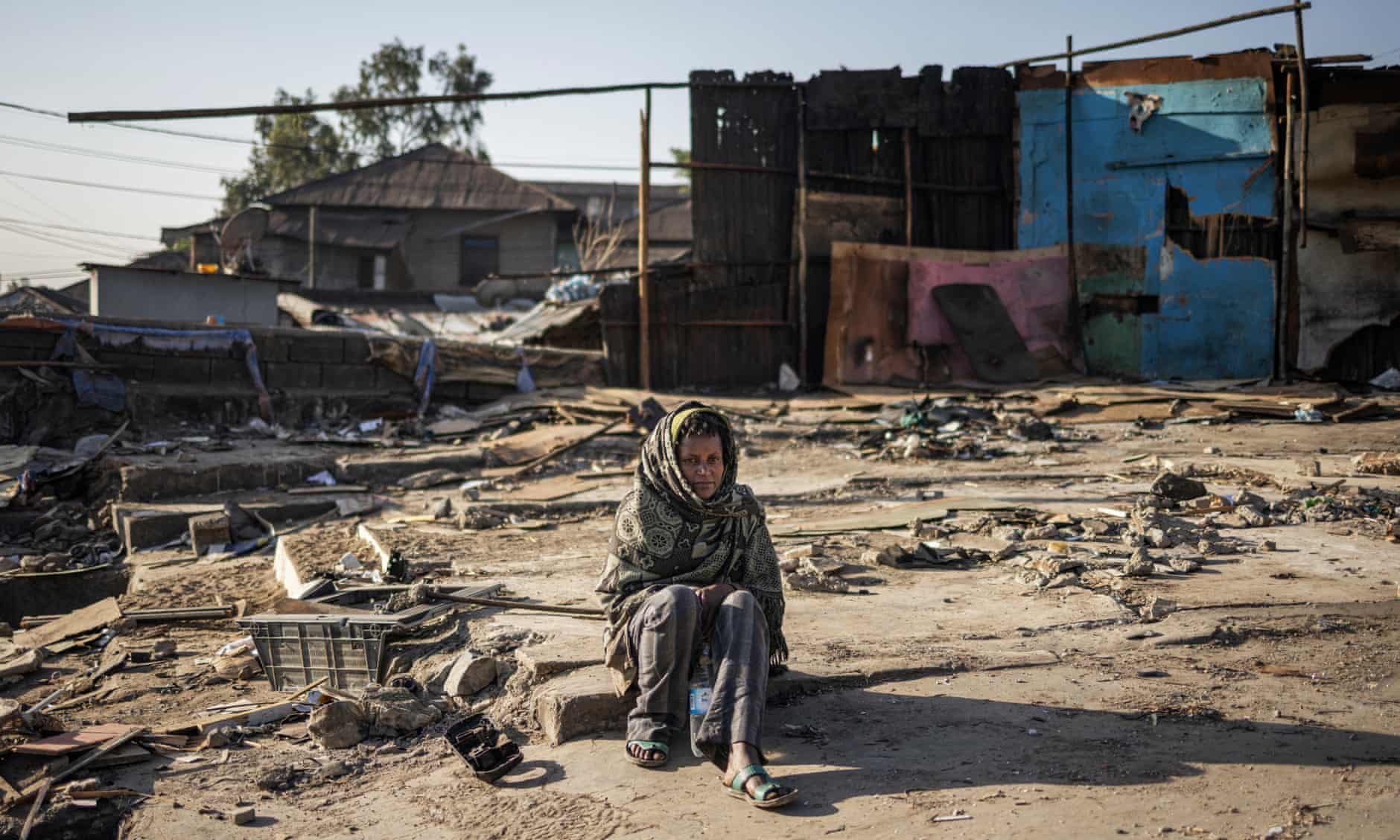 Dismay in Addis Ababa as ‘the soul of the city’ is razed for development
Dismay in Addis Ababa as ‘the soul of the city’ is razed for development
Ethiopia’s push to attract tourism and investment has seen the demolition of a historic district in the capital, with people’s homes and livelihoods destroyed
Thu 4 Apr 2024 07.00 EDT
In the heart of Addis Ababa, the historic, ramshackle neighbourhood of Piassa once teemed with shops and cafes. People would come from across Ethiopia’s capital city to buy anything from jeans to jewellery.
Today it lies in ruins. Its distinctive stone houses, with their wooden balconies and slanting metal roofs, are almost all gone. In their place are jagged fields of rubble, picked over by workers with sledgehammers.
People stop to stare at the wreckage. Some take pictures. But they do not stay long: the ruins are guarded by police carrying clubs. “I’m angry,” says a former resident. “It’s my heritage that’s been destroyed in front of my eyes, without any consultation at all. We were never told the plan.”
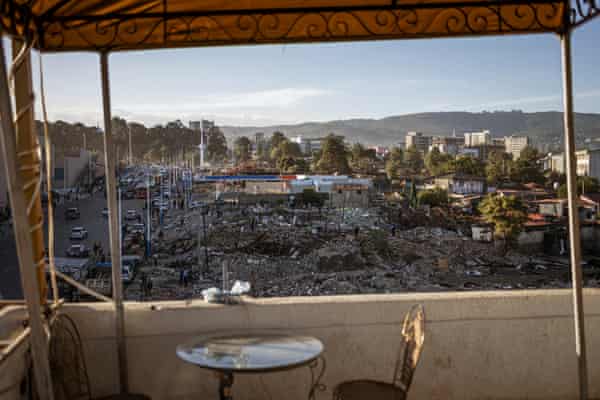
The extent of the destruction of buildings in Piassa can be seen from a terrace in the Addis Ababa neighbourhood. Photograph: Michele Spatari/AFP/Getty Images
For years there had been vague talk of demolishing Piassa, sweeping away the densely packed shantytowns that had sprung up between its historic buildings. The area has witnessed small-scale demolitions. But when the bulldozers moved in last month, it was unexpected. One person says they were given five days’ notice that their family home of more than 50 years would be knocked down. The water and power were cut off after three days.
“Many of our belongings were damaged or stolen during the chaotic process of vacating,” they say.
Like everyone in Addis Ababa the Guardian spoke to, they talked on the condition of anonymity, citing fear of reprisals. Several former residents and heritage experts declined to be interviewed at all.
A new building stands at the heart of Piassa: the recently inaugurated Adwa Victory Memorial Museum. A low-slung complex of orange stone, constructed to commemorate Ethiopia’s historic defeat of Italian colonialists in 1896, it is the latest large-scale project built by Abiy Ahmed, the prime minister since 2018.
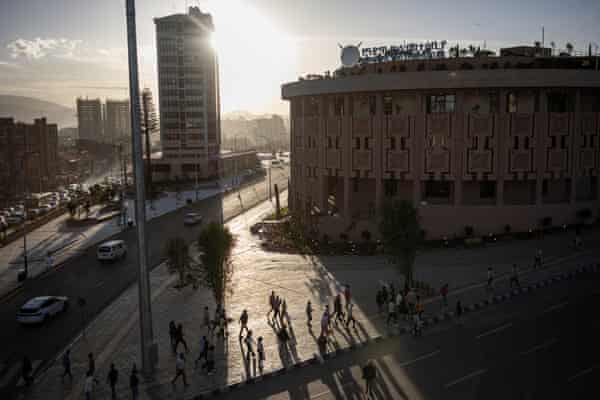
The Adwa Victory Memorial Museum in Piassa, Addis Ababa, one of prime minister Abiy Ahmed’s large-scale projects. Photograph: Michele Spatari/AFP/Getty Images
His other projects include a national library, a science museum and a host of manicured parks. Abiy’s administration has also renovated Meskel Square, Ethiopia’s most important public space. The biggest venture is a palace complex on a hill above the city, reported to cost $10bn (£8bn). The financing of the grand palace is opaque, though most western diplomats in the city suspect it is being bankrolled by the United Arab Emirates, which has been expanding its influence in the Horn of Africa. When questioned by MPs last year, Abiy said it did not concern them because it was not part of the official budget.
“This is a leader who uses built space as a political tool,” says an architect. “Every time people ask about these projects, they are just shut down.”
Piassa was torn down as part of a “road-widening project”. Other demolitions are also taking place. A tailor in a neighbouring district to Piassa said they were given one hour to clear their shop, with no explanation. They later discovered it is due to be replaced by a cycle path.
Piassa was built by Emperor Menelik II, the father of modern Ethiopia, soon after he founded Addis Ababa in the 1880s. It was developed by the Italians, who gave it its current name – it is sometimes called Piazza – during their occupation of Ethiopia in the 1930s. People in the capital considered it their Old Town, but it was also a hub of modernity throughout the 20th century, the place where new technologies first arrived in the country.
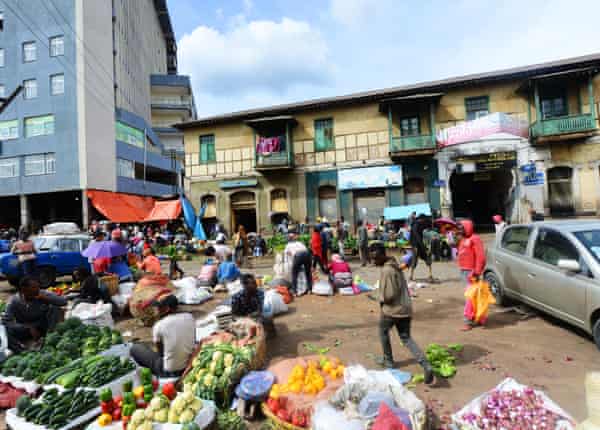
The busy outdoor market at Piassa in Addis Ababa. The neighbourhood is being cleared to make way for a road-widening project. Photograph: Boaz Rottem/Alamy
“It was the seat of modern Ethiopian history,” says a heritage expert. “They wouldn’t have wiped out their own heritage if they understood this.” Marco Di Nunzio, an anthropologist at the University of Birmingham who studied Addis Ababa’s inner city for several years, says: “There’s no doubt the area needed renovation. But the question is how to do that. The demolitions have not only destroyed old buildings that needed upgrading. They have disrupted livelihoods, displaced residents and damaged part of the soul of the city.”
Like the people cleared from other city neighbourhoods, those uprooted from Piassa have been relocated to new housing. This is often on the outskirts of the city, far from their schools and workplaces. Much of it is unfinished. A video shared by one person removed from Piassa of their new apartment shows a concrete husk, with no plaster on the walls, and no flooring, glazing or plumbing. “There were people who were more unfortunate than us, who were told they would be living in blocks of apartments which don’t exist,” she says.
Experts say Piassa’s destruction broke Ethiopia’s heritage law and urban planning regulations, though the government denies this. Thirty-six of the neighbourhood’s 42 listed buildings have either been destroyed or earmarked for demolition, say heritage experts. Abiy believes it is necessary to remove poverty from Addis’s centre to attract foreign investment and tourism. Earlier this month, he suggested Dubai as a model.
“While some individuals may be disappointed that their fences are being demolished, the country will not change unless we take bold measures,” Abiy said. “In a year’s time, we will witness a transformed Addis Ababa. Tourists will start to come, increasing the value of your property.”
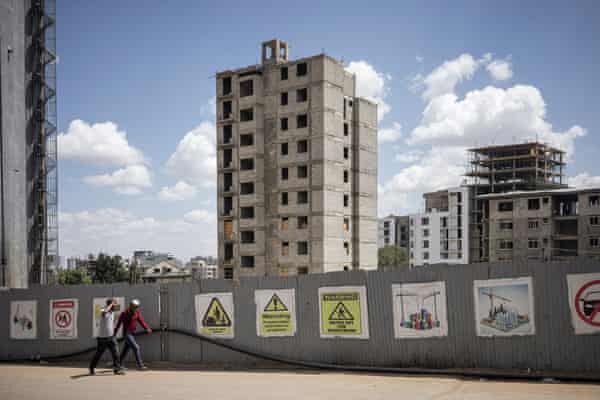
A building site in Piassa, Addis Ababa. The government aims to transform the historic neighbourhood to attract tourists. Photograph: Michele Spatari/AFP/Getty Images
Yet some in the city are questioning if these projects are the best use of public funds. Ethiopia is struggling with soaring inflation and a foreign currency crunch. It is also facing a reconstruction bill of nearly $23bn from a two-year civil war in Tigray, which ended in 2022. Millions of Ethiopians rely on food aid, but the humanitarian response plan to help them was only 34% funded last year.
The city is now coming to terms with its loss. “You don’t have to choose between heritage and development,” says a resident. “Piassa should have been protected and conserved, and this could have easily been done.”
https://amp.theguardian.com/global-deve ... t-ethiopia
-
Selam/
- Senior Member
- Posts: 11861
- Joined: 04 Aug 2018, 13:15
Post
by Selam/ » 12 Apr 2024, 07:39
-
Axumezana
- Senior Member
- Posts: 13660
- Joined: 27 Jan 2020, 23:15
Post
by Axumezana » 12 Apr 2024, 09:44
Any facility with out continuous preventive maintenance is ultimately to be a failure. Even the parks Abiy has been building require a trained personnel to manage and maintain them.Considering the low utilization of those parks due to lower demand due to the ongoing instability , these parks will be in ruin within five years! PP is filled by a showy personnel under cult type leadership of one man.
-
TesfaNews
- Member+
- Posts: 6862
- Joined: 14 Feb 2020, 22:23
- Location: Ras Mesobawian
Post
by TesfaNews » 12 Apr 2024, 09:50
Axumezana wrote: ↑12 Apr 2024, 09:44
Any facility with out continuous preventive maintenance is ultimately to be a failure. Even the parks Abiy has been building require a trained personnel to manage and maintain them.Considering the low utilization of those parks due to lower demand due to the ongoing instability , these parks will be in ruin within five years! PP is filled by a showy personnel under cult type leadership of one man.
No worries the leadership of one man will restore our access to red sea!
-
kebena05
- Member
- Posts: 2319
- Joined: 10 Nov 2019, 14:58
Post
by kebena05 » 12 Apr 2024, 09:51
የአጋሜ ልጅ ደደቦ
እድሜ ለወያኔሽ ለዚህ ሁሉ ስቃና መከራ አገሪቱ የወደቀችው በናንተ ደንቆሮዎች አጋሜ ነው። አብይ እና ፒፒ እኮ የናንተን ጡት እየጠቡ ያደጉ ጥበቶች ናቸው። አራት ነጥብ።
Selam/ wrote: ↑12 Apr 2024, 07:00
Bloomberg: A Crumbling Metro Reveals Failed Promise of China’s Billions in Africa

The Addis Ababa skyline is seen from the light rail system on Nov. 19, 2023.Photographer: Michele Spatari/AFP via Getty Images
By Fasika Tadesse
April 12, 2024 at 12:00 AM EDT
Almost a decade ago, the light-rail system in Ethiopia’s bustling capital of Addis Ababa was hailed as a revolutionary solution to the city’s transportation woes. Envisioned as a project that would redefine urban transport, the system promised to sweep up to 60,000 passengers per hour along its tracks.
Today it sits as a daily reminder of the broken promises of China-funded infrastructure investments that swept Africa in recent years. Frequent breakdowns, inadequate maintenance funding and operational constraints mean barely one-third of its 41 trains are operational, ferrying 55,000 passengers a day, a fraction of initial projections.
Once bustling and vibrant train stations now exude an air of desolation and neglect, contrasting sharply with the city’s urgent transportation needs for its almost 4 million residents. Inoperable trains are regularly parked at the railway’s garage, awaiting maintenance.
Overcrowding on those trains that do run has forced many commuters to seek new ways to get around. Yared Mekuanint, 36, who has been using the train since its launch, has largely abandoned the system.
Waiting times for a train can now stretch to 20 to 25 minutes, he said, four times the six minutes between services in the early days.
“You might not even get onto the train after all this wait, especially during peak hours,” he said. “You may realize it’s full, and no space to accommodate you, when the train arrives after all that wait. You have to wait another 20 minutes to try your luck with the next train.”

At its 2015 opening, the light rail network promised low-cost, efficient transport. Some users then said their commuting time was cut by two-thirds.Photographer: William Davison/Bloomberg
Despite the critical shortage of transportation options in the city, commuters are increasingly opting for public buses and privately operated mini-buses, albeit at a slightly higher cost compared to the light-rail system.
The light rail is among 70 mega projects that Ethiopia undertook with a $14.8 billion loan from the Chinese government and related financial institutions between 2006 and 2018, data from the Ministry of Finance show. The works include construction of the Ethio-Djibouti railway, an airport expansion, and major road-infrastructure projects.
From Kenya to Nigeria and beyond, China over the past decade has loaned billions across Africa and other parts of the so-called Global South as part of its drive to gain sway and counter US influence, build markets for its products and gain access to the natural resources needed to drive its economy back home. The US says the money simply leaves host governments mired in debt.
China Railway Engineering Group spearheaded the three-year construction effort, followed by an additional three years of managing operations and maintenance post-launch along with another Chinese firm, Shenzhen Metro Group. The project, with a total cost of $475 million, relied heavily on an 85% loan from the Export-Import Bank of China, with the remaining funds sourced from the government’s coffers.
During the ribbon-cutting ceremony in September 2015, former Transport Minister Workneh Gebeyehu, who is currently the executive secretary at the Intergovernmental Authority on Development regional economic bloc, said the railway would have a transformative effect.
“We’re confident that this railway will bring about significant improvements in the transportation network,” he stated.
As time passed, lofty promises made by officials and the high expectations of commuters have failed to materialize. And numerous obstacles mean no turnaround is imminent.
Key hurdles include frequent power outages, inadequate local maintenance facilities, limited availability of spare parts, and challenges in accessing foreign currency for importing spare parts from China, says Mitiku Asmare, head of the city’s transport agency.
The greatest concern is the project’s inability to repay its debt, resorting to local bank loans to stay afloat. And running the system below capacity means revenue is insufficient to cover future payments.
The project may have prioritized short-term political goals over long-term operational sustainability, says Frangton Chiyemura, a lecturer in Global Development at the UK Open University’s Development Policy and Practice Group who studies China-Africa relations and Chinese-funded projects in Africa.
The project’s original sin was poor planning, with insufficient arrangements in place to cover needs including maintenance work, spare parts, and the required local skills to sustainably run the project, Chiyemura said. He cited a standard-gauge, China-backed railway in Nigeria as an analogue to the Ethiopian metro, saddling the government with infrastructure and its associated maintenance costs.
Addis Ababa officials are now seeking solutions for a turnaround. Previously run under the management of the Ethiopian Railway Corporation — the national operator overseeing the Chinese built Addis Ababa–Djibouti Railway — the local system has now been transferred to the city transport agency.
“We are currently looking for a consultant to examine the challenges, identify their sources, and provide recommendations on how to improve functionality,” Mitiku said, declining to estimate when fixes will be made.
The Chinese government has pledged support by repairing the dysfunctional trains. Last year, the government signed an agreement with China that will provide hundreds of spare parts worth $23 million to maintain the units and an additional seven trains.
https://www.bloomberg.com/news/articles ... rom-africa
-
Right
- Member
- Posts: 2843
- Joined: 09 Jan 2022, 13:05
Post
by Right » 12 Apr 2024, 10:48
You can’t cheat the economy.
Printing money and borrowing money that you can’t afford to pay will only accelerate the downturn.
This is the tip of the iceberg. A total collapse is inevitable. It is a matter of time. UAE is pumping money in secret as a form of loan. That too will end ver soon.
The economy needs craftsmanship. That department alone needs the best of the bests. PP is allergic to knowledgeable professionals instead dwells in ethnic patronage.
-
Selam/
- Senior Member
- Posts: 11861
- Joined: 04 Aug 2018, 13:15
Post
by Selam/ » 12 Apr 2024, 16:10
ቀንዳም ሻቦ - እንደ እርጎ ዝንብ ከነቆሻሻህ ዘለህ ጥልቅ አትበል፤ ስለ ሽራፊ የኤርትራ ክፍለ ሃገር በሌላ ርዕስ ልንወያይ እንችላለን። ቀላዋጭ!
kebena05 wrote: ↑12 Apr 2024, 09:51
የአጋሜ ልጅ ደደቦ
እድሜ ለወያኔሽ ለዚህ ሁሉ ስቃና መከራ አገሪቱ የወደቀችው በናንተ ደንቆሮዎች [deleted] ነው። አብይ እና ፒፒ እኮ የናንተን ጡት እየጠቡ ያደጉ ጥበቶች ናቸው። አራት ነጥብ።








